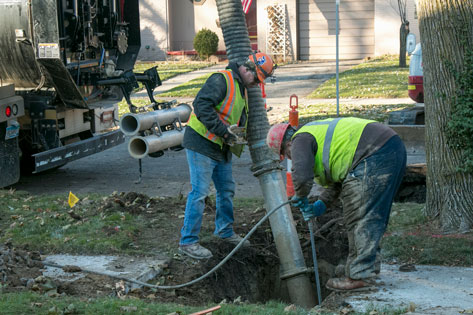“When I signed up for the Flint Registry two years ago, I was immediately informed about different resources available throughout the community, and I had the opportunity to listen to speakers brought in to discuss different topics affecting the city. The Registry is important because it empowers people to want to be advocates and speak up for what’s right.”
— Danielle Snell

THE ISSUE
Since July 2016, the city of Flint’s water system has been tested to ensure that both lead and copper levels are within allowable levels. For the past seven years, water has tested below federal action levels. Testing above allowable levels would require a number of water treatment and public notification protocols. Despite this good news, pipe replacement is still underway, no one has been held accountable for the decisions that led to the switch to river water, and lawsuits have yet to yield compensation for residents. All of this results in lingering negative effects from the crisis, including a lack of trust in systems and institutions.
THE RESPONSE
The city of Flint will continue to inspect service lines in the public rights-of-way — the city-owned spaces between sidewalks and curbs — to determine if they are made of lead. The city is required to notify residents when lead service lines are discovered. However, to complete lead service line replacement, residents must give consent for city of Flint contractors to access their homes and must be present at the scheduled time. All work is done at no cost to residents. The city of Flint has completed outreach and attempted to obtain consent from over 31,000 households. Lead line replacement resumed on April 30. Those who still want to take advantage of the opportunity should call 810-410-1133.
The McKenzie Patrice Croom Flint Community Lab at the Flint Development Center offers free drinking water testing to Flint residents. This state-of-the-art lab tests drinking water for lead and copper. Outreach staff work with households to collect samples and then provide information about test results and related resources, such as access to water filters, in-home repair programs and health care.




DID YOU KNOW?
Mott grantees and other nonprofit organizations helped lay the groundwork for elevating lead pipe replacement as a federal priority in response to the Flint water crisis. In 2021, the Biden administration’s Bipartisan Infrastructure Law included $15 billion for lead service line replacement in the nation’s most impacted communities. Service lines connect the municipal water system to an individual home, business or other facility. In 2023, the U.S. Environmental Protection Agency proposed a rule that would require water systems across the country to replace most lead service lines within 10 years.
Municipalities across the country are exploring water affordability models through which the cost of water would not exceed a certain percentage of household income. Progress has been made on developing a water assistance program in Detroit that would end water shutoffs for low-income residents. There are currently conversations about developing a statewide program to reduce the cost of water for Michigan residents and provide temporary assistance to qualified residents.

